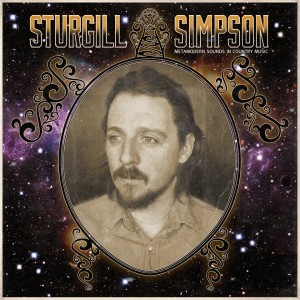Show Review: Sturgill Simpson, 2/20 Paradise, Boston
Turns out that even with the flu Sturgill Simpson puts on a damn good show. At the beginning of his two-hour set on Friday at the Paradise, Sturgill said they almost canceled the night before launching into a screaming rendition of “Sitting Here Without You.”
 (photo credit David McClister)
(photo credit David McClister)
It was the kind of show that earns an artist lifelong fans–most of us in the audience would have called in sick and curled up in the fetal position if we’d felt the way he did. In between several songs, the band exchanged sometimes doubtful, sometimes encouraging looks with Simpson as he gargled hot water and popped cough drops to get the most of of his voice. I heard one person comparing the performance to Michael Jordan’s “flu game” against the Jazz in 1997. So, when his voice occasionally–and this was only occasionally–gave out, it was more inspiring than disappointing and just made the crowd sing along louder.
The band, it has to be said, was incredible tonight. They’re a very tight group on any night, but they extended many songs with escalating solos from lead guitarist Laur Joamets. It must have helped Sturgill’s voice to be able to take a few minutes off while Joamets stunned the crowd with his very fast, very clean lead breaks and rhythm section Miles Miller and Kevin Black drove the tempo. In any case, these songs were some of the highlights of the night. Sturgill and Laur traded breaks on the dark, but honest, tune about disappointments and being let down, “Some Days,” and the bluegrass classic “Poor Rambler” which included a medley with the Stanley Brothers’ “Sharecropper’s Son.” In appreciation, when the band was introduced, the crowd responded with extended applause, especially for Joamets.
 “You Can Have the Crown,” a song that was written initially as a joke, but has become a crowd favorite, starts with the lines: “I been spending all my money on weed and pills, / Trying to write a song that’ll pay the bills / But it ain’t come yet, guess I’ll have to rob a bank.” Simpson paused after the first chorus to say, “The last time we played Boston, there were, like, sixteen people there. It’s been a crazy year and you all did that.” He has gone from relative obscurity to widespread acclaim in a very short period, and he did it, up until now, releasing his own music without support from a label. He followed “You Can Have The Crown,” with the song he wrote that could pay the bills, “Turtles All the Way Down.” It is the first song on his breakthrough album Metamodern Sounds in Country Music and its themes of spiritual reflection echo in other songs. Much has been made of “Turtles,” and the album’s appreciation for drugs, but I think that focus sidesteps the much deeper investigations of the mundane and spiritual: in “Living the Dream,” for instance, the song’s narrator is sitting in a diner, “Hoping them circles on the paper don’t call back telling me to start today,” and in the next line is reflecting on the “old man upstairs,” who, “wears a crooked smile, staring down on the chaos he created.” It’s this connection that interests me, as a listener, the most–the acknowledgement that it is a very common experience for everyday folks to look up and wonder what all this is about. Drugs help clarify some of that, but in the end, Sturgill writes, “love’s the only thing that ever saved my life.” Amen.
“You Can Have the Crown,” a song that was written initially as a joke, but has become a crowd favorite, starts with the lines: “I been spending all my money on weed and pills, / Trying to write a song that’ll pay the bills / But it ain’t come yet, guess I’ll have to rob a bank.” Simpson paused after the first chorus to say, “The last time we played Boston, there were, like, sixteen people there. It’s been a crazy year and you all did that.” He has gone from relative obscurity to widespread acclaim in a very short period, and he did it, up until now, releasing his own music without support from a label. He followed “You Can Have The Crown,” with the song he wrote that could pay the bills, “Turtles All the Way Down.” It is the first song on his breakthrough album Metamodern Sounds in Country Music and its themes of spiritual reflection echo in other songs. Much has been made of “Turtles,” and the album’s appreciation for drugs, but I think that focus sidesteps the much deeper investigations of the mundane and spiritual: in “Living the Dream,” for instance, the song’s narrator is sitting in a diner, “Hoping them circles on the paper don’t call back telling me to start today,” and in the next line is reflecting on the “old man upstairs,” who, “wears a crooked smile, staring down on the chaos he created.” It’s this connection that interests me, as a listener, the most–the acknowledgement that it is a very common experience for everyday folks to look up and wonder what all this is about. Drugs help clarify some of that, but in the end, Sturgill writes, “love’s the only thing that ever saved my life.” Amen.
After he left the stage there was some murmuring about whether or not he’d do an encore. I don’t think anyone there would have begrudged him a bed at that point in the night, but we were all excited when the band came back out. They finished the night with the Osborne Brothers’ tune “Listening in the Rain” with a little of T-Rex’s “Motivator” thrown in for good measure and iconoclasm. “We don’t play it like the Osborne Brothers do,” Simpson said. “We’ll see how they feel about that down in Texas.” If they don’t like it, Boston’ll have you back.
